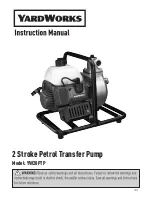
10
!
Please note
Avoid damaging the appliance
during transport.
Never
put weight on top of the
appliance.
!
Please note
If the compressor in the external
unit is strongly tilted, lubricant will
enter the refrigerant circuit and
damage the appliance.
Note the max. tilting angle of
45°.
Installation requirements
Installation site
■ Select a site with good air circulation,
so that the cooled air can dissipate and
be replaced by warm air.
■ Avoid direct insolation.
■ When siting the unit in a location
exposed to wind, ensure that the wind
does not affect the fan area. This could
result in an "air short circuit" between
the air being discharged and the air
being drawn in. Strong wind can have
a negative influence on the evaporator
ventilation.
!
Please note
An "air short circuit" during
heating operation
will result in
the cooled discharged air re-
entering the unit. This can
result in reduced heat pump
efficiency and defrosting prob-
lems.
Avoid "air short circuits".
!
Please note
An "air short circuit" during
cooling operation
will result in
the heated discharged air re-
entering the unit. This can lead
to high pressure faults.
Avoid "air short circuits".
■ Take the lengths of the refrigerant
lines into account (see "Connecting
refrigerant lines").
■ Select the installation site so that the
evaporator cannot be blocked by
leaves, snow etc.
■ Select the installation site with due
consideration of the physical laws of
sound dissipation and reflection.
Technical guide "Heat pump
principles"
■ Never site in corners, recesses or
between walls.
■ Never install next to or below bedroom
windows.
■ Never install closer than 3 m to path-
ways, downpipes or sealed surfaces.
The cooled air in the discharge area
creates a risk of ice forming when out-
side temperatures fall below 10 °C.
■ The installation site should be easily
accessible, for example for mainte-
nance work (see "Minimum clearan-
ces").
Installation sequence
Installing the external unit
5782 201 GB











































